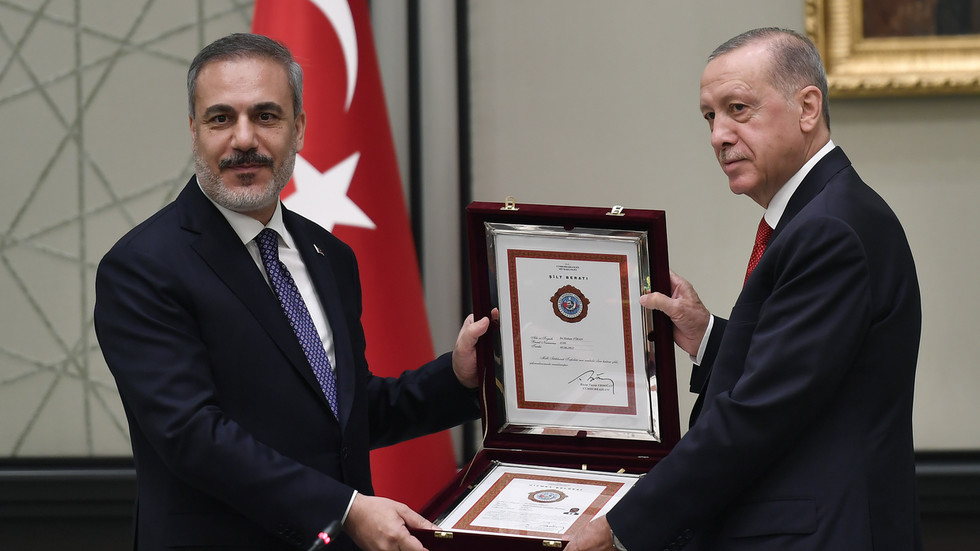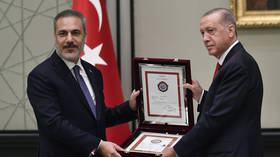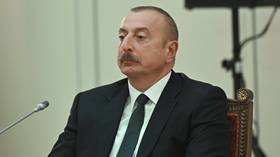
The previous head of the country’s intelligence service has indicated his agency lost members in the Karabakh war

Turkish President Recep Tayyip Erdogan (R) presents a gift to the Turkish Foreign Minister Hakan Fidan (L) during a meeting of the National Security Council (MGK) in Ankara, Turkiye on August 9, 2023. © TUR Presidency / Mustafa Oztartan / Handout/Anadolu Agency via Getty Images
Turkish Foreign Minister Hakan Fidan, who previously headed the National Intelligence Organization (MIT) for 13 years, has suggested that Ankara played a direct role in the Second Nagorno-Karabakh war in 2020.
Before a meeting of Türkiye’s National Security Council (MGK), President Recep Tayyip Erdogan awarded Fidan with a medal for distinguished service for his work as deputy undersecretary and president of MIT.
Upon receiving the award, Fidan stated that “I am receiving this medal on behalf of my friends, who were martyred in Libya, Karabakh, Syria, and Iraq to carry out your orders while serving with me.”
Fidan’s statement suggested Türkiye had been involved in the Armenia-Azerbaijan conflict, which cost thousands of servicemen and over a hundred civilians their lives.
Suspicions of Ankara’s role in the Second Karabakh War stretch back to 2020, when a number of reports, as well as several US and French officials, implied Türkiye had helped Azerbaijan prepare and instigate the conflict. Citing military and diplomatic sources, the Kommersant newspaper alleged that Ankara had helped Baku by supplying it with weapons and had even sent in fighters from Syria and Libya.
Officially, the relationship between Ankara and Baku was limited to political support, as well as occasional joint military exercises. However, Kommersant’s report claims that only one month before the hostilities in Karabakh broke out, Türkiye had deployed a large contingent of its forces to Azerbaijan, who ended up playing a key role in coordinating and planning offensive operations against Armenian positions in the region.

Read more
The Karabakh war officially ended after Russia brokered a ceasefire between the two sides and sent in peacekeepers along the contact line to help maintain it. Since then, Ankara has also said it would assist with the peacekeeping mission and has positioned 60 soldiers to serve at a joint monitoring center opened by Russia and Türkiye in the eastern part of the Nagorno-Karabakh region.
The Nagorno-Karabakh dispute dates back to 1988, when the ethnic Armenian majority region broke away from Azerbaijan, triggering an ethnic conflict that claimed thousands of lives before it was frozen by a 1994 truce. In 2020, fighting broke out once again in what is now called the Second Nagorno-Karabakh War. Despite Russia freezing the conflict with a ceasefire, the region has continued to see occasional flare-ups between the two neighbors.




